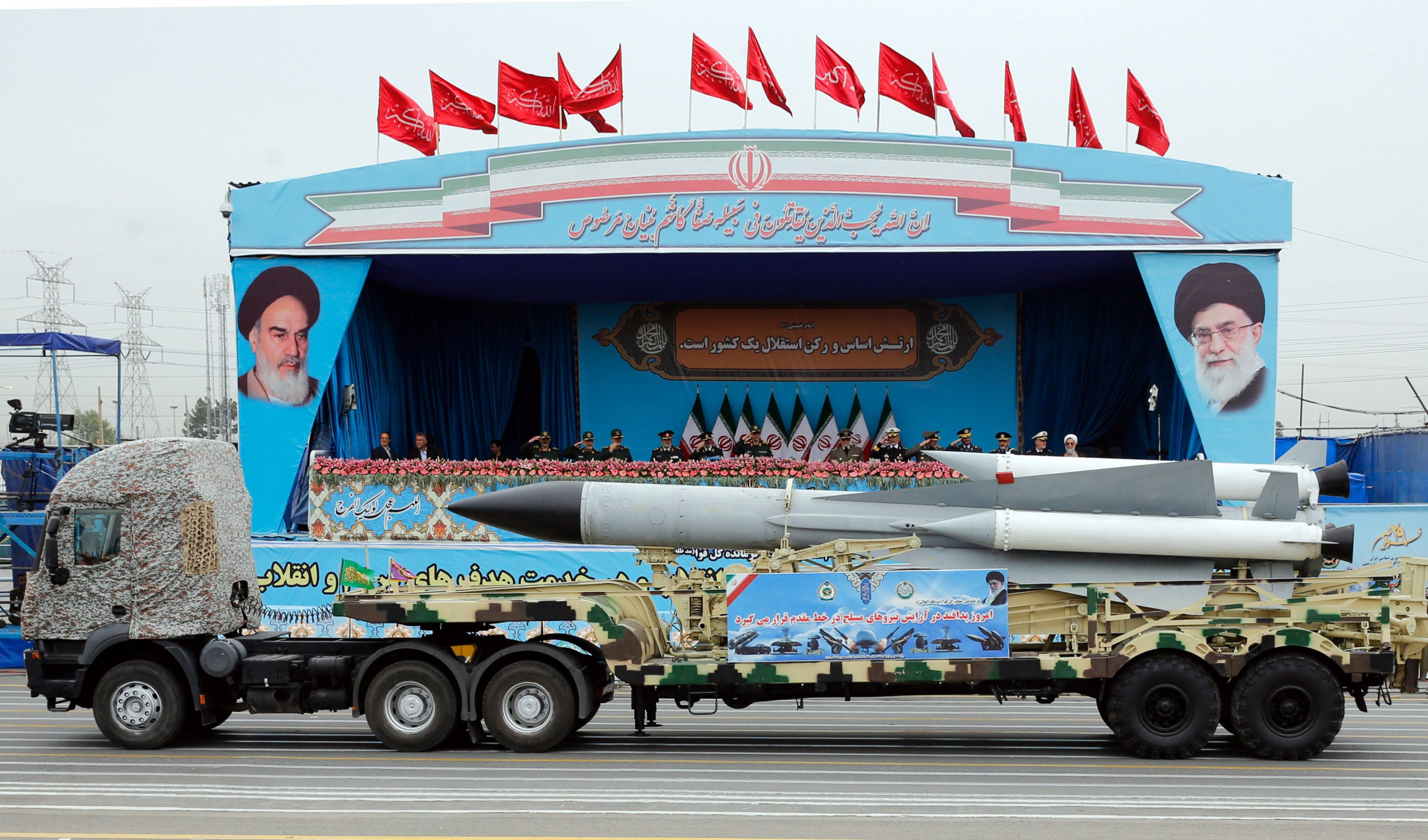唐纳德·特朗普总统表示,他不想推翻伊朗政府,此前他的最高外交官称,伊朗伊斯兰共和国准备就其弹道导弹计划进行谈判。
特朗普周二在内阁会议上表示,他的政府已经在伊朗问题上取得了进展,并“不寻求政权更迭”,但“希望他们离开也门”美国指责伊朗支持扎伊迪什叶派穆斯林反叛组织安萨尔·阿拉(Ansar Allah),该组织目前正与沙特领导的支持该国流离失所政府的联盟进行为期四年的战争。
这些评论发表之际,华盛顿和德黑兰正经历两国数十年敌对历史中最紧张的时期之一。自特朗普去年决定放弃2015年核协议并对伊朗实施制裁以来,形势一直很严峻。特朗普指责伊朗利用制裁救济来支持激进组织,并进一步发展其导弹计划。
特朗普周二发表评论后,美国国务卿迈克·庞贝(Mike Pompeo)声称,“伊朗官员”第一次准备就他们的导弹计划进行谈判。”

4月18日,德黑兰,一年一度的国军日阅兵式上,一辆载有导弹的伊朗军用卡车在官员看台前行驶。伊朗拥有中东最大、最多样化的导弹库,迄今为止一直以外国威胁为由抵制限制它的努力。法新社/盖蒂图片社
此前一天,伊朗外交部长穆罕默德贾瓦德扎里夫(Mohammad Javad Zarif)在接受美国全国广播公司新闻采访时批评美国向沙特阿拉伯和阿拉伯联合酋长国等中东国家出售价值数十亿美元的武器,警告称“美国武器正在进入我们的地区,使我们的地区准备爆炸”。他补充道:“如果他们想谈论我们的导弹,他们首先需要停止出售所有这些武器,包括导弹。”
美联社对这些言论的报道最初的标题是“伊朗高级外交官称弹道导弹会谈是可能的”,引起了伊朗外交官的负面反应。
伊朗驻联合国代表团媒体办公室主任阿里雷扎·米尔尤素菲和他的同事在周二发表的一份声明中说"断然拒绝美联社对外交部长扎里夫对全国广播公司新闻的评论的描述...这意味着伊朗愿意在某个时候就其防御导弹计划进行谈判。"
“伊朗的导弹是绝对的,在任何情况下都不能与任何人或任何国家谈判,”它补充道。美联社记者当然对英语会话非常熟悉,能够了解和理解,能够把对假设的评论放在上下文中,也能够用语言来表达观点。当在上下文中说的话显而易见时,为了追求标题而得出错误的结论只会导致媒体在公众中的地位降低。”
扎里夫周一还告诉NBC新闻,当谈到德黑兰和美国目前的僵局时,“只有在特朗普退出协议后美国实施的单边制裁“解除”后,open"—but才有广阔的谈判空间。”这些经济限制旨在迫使其他国家切断与德黑兰的贸易关系,包括核协议的其他签署国——中国、欧盟、法国、德国、俄罗斯和英国——所有这些国家仍然支持该协议。
然而,随着美国对伊朗的“最大压力”运动加倍,欧洲已经实施缓慢一种旨在绕过这些制裁的特殊贸易工具,导致伊朗开始重新考虑自己对该协议的承诺。自那以后,伊朗已经开始将铀浓缩到超出限制的水平,这让剩余的核交易方感到沮丧,他们仍然拒绝启动一个争端解决机制,正式指控伊朗违约。
核协议各方还呼吁华盛顿和德黑兰缓和波斯湾日益加剧的不和。美国指责伊朗是阿曼湾油轮袭击的幕后黑手,德黑兰否认了这一点,革命卫队最近击落了一架美国海军无人驾驶飞机,导致特朗普下令实施报复性袭击,并在处决后几分钟内取消了这些袭击。
在最近的一次潜在爆发中,美国和英国的报道称,伊朗船只试图靠近波斯湾的一艘英国油轮,但被一艘英国军舰挡了回去。伊朗政治和军事官员否认了这一事件,但誓言要对英国在直布罗陀扣押一艘伊朗超级油轮进行报复。当局指控这艘船试图向叙利亚运送石油——这违反了欧盟的制裁,但伊朗并未受到制裁。
DONALD TRUMP 'NOT LOOKING FOR REGIME CHANGE IN IRAN,' MIKE POMPEO SAYS THEY ARE PREPARED TO TALK MISSILES
President Donald Trump said he does not want to overthrow the Iranian government after his top diplomat claimed the Islamic Republic was prepared to negotiate on its ballistic missile program.
Trump told a Cabinet meeting Tuesday that his administration has made progress with Iran and was "not looking for regime change" there, but did "want them out of Yemen." The U.S. has accused Iran of supporting a Zaidi Shiite Muslim rebel group known as Ansar Allah, or the Houthis, currently engaged in a four-year war against a Saudi-led coalition backing the country's displaced government.
The comments came as Washington and Tehran underwent one of the tensest periods in a hostile decades-long history between the nations. The situation has been grave since Trump's decision last year to abandon a 2015 nuclear deal and impose sanctions on Iran, which he accused of using sanctions relief to back militant groups and further develop its missile program.
Following Trump's comments Tuesday, Secretary of State Mike Pompeo claimed that "for the first time" Iranian officials "are ready to negotiate on their missile program."

A Iranian military truck carrying a missile drives in front of the officials' stand during a military parade marking the annual National Army Day in Tehran, April 18. Iran has the largest and most diverse missile arsenal in the Middle East and has so far resisted efforts to restraint it, citing foreign threats.AFP/GETTY IMAGES
The news came one day after Iranian Foreign Minister Mohammad Javad Zarif criticized billions of dollars worth of U.S. arms sales to Middle Eastern nations such as Saudi Arabia and the United Arab Emirates, warning that "American weaponry is going into our region, making our region ready to explode" in an interview with NBC News. He added: "if they want to talk about our missiles, they need first to stop selling all these weapons, including missiles."
The Associated Press' coverage of these remarks originally carried the headline "Top Iran diplomat says talks on ballistic missiles possible," drawing a negative reaction from Iranian diplomats.
In a statement shared Tuesday, Alireza Miryousefi, head of the media office for Iran's mission to the United Nations, said he and his colleagues "categorically reject the AP's characterization of Foreign Minister Zarif's comments to NBC News...as meaning that Iran is willing to negotiate on its defensive missile program at some point."
"Iran's missiles are absolutely and under no condition negotiable with anyone or any country, period," It added. "Surely AP reporters are familiar enough with conversational English to know and understand and are able to contextualize comments on the hypothetical, as well as parrying with words to make a point. Drawing a false conclusion in pursuit of headlines, when what was said in the context was obvious, only leads to a diminution of the standing of the press with the public."
Zarif also told NBC News on Monday that, when it came to Tehran and Washington's current standoff, "the room for negotiation is wide open"—but only once unilateral U.S. sanctions imposed after Trump's deal withdrawal "are lifted." These economic restrictions were designed to pressure other countries into cutting trade ties with Tehran, including the nuclear deal's other signatories—China, the European Union, France, Germany, Russia and the United Kingdom—all of whom still support the agreement.
With the U.S. doubling down on its "maximum pressure" campaign against Iran, however, Europe has been slow to implement a special trade vehicle designed to bypass these sanctions, leading Iran to begin reconsidering its own commitments to the deal. The country has since begun enriching uranium beyond restricted levels, frustrating the remaining nuclear deal parties, who still refused to trigger a dispute resolution mechanism that would formally charge Iran with non-compliance.
The nuclear deal parties have also called on Washington and Tehran to de-escalate mounting discord in the Persian Gulf. The U.S. has accused Iran of being behind attacks on oil tankers in the Gulf of Oman, something Tehran has denied, and the Revolutionary Guards' recent downing of a U.S. Navy drone led Trump to order retaliatory strikes he then canceled within minutes of their execution.
In the most recent potential flare-up, reports in the U.S. and U.K. claimed that Iranian vessels attempted to approach a U.K. oil tanker in the Persian Gulf, only to be turned back by a U.K. warship. Iranian political and military officials denied the incident, but have vowed to retaliate for the U.K.'s seizure of an Iranian supertanker in Gibraltar, where authorities accused the vessel of attempting to ship oil to Syria—a violation of EU sanctions to which Iran, however, was not subject.
The current, Shiite Muslim cleric-led Iranian government's contempt for both the U.S. and the U.K. has its roots in their backing for the former monarchy that they helped reinstall in a 1953 coup orchestrated by the CIA. The West-backed monarchy, led by the shah, was eventually overthrown in the 1979 Islamic Revolution and, while Trump has repeatedly disavowed regime change, hawkish administration officials such as Pompeo and White House national security adviser John Bolton have previously discussed the prospects of ousting the Islamic Republic's government.
Tehran has often cited such rhetoric, along with threats by regional U.S. partners like Israel, Saudi Arabia and the UAE as justifying its missile program, already the largest and most diverse in the Middle East. The country has always denied seeking nuclear weapons in spite of the accusations of these foes.
Update (2:43 p.m. 7/16/2019) This article has been updated to include the full statement shared by Iran's mission to the United Nations in reaction to the Associated Press' coverage of remarks made by Foreign Minister Mohammad Javad Zarif during an interview with NBC News.





